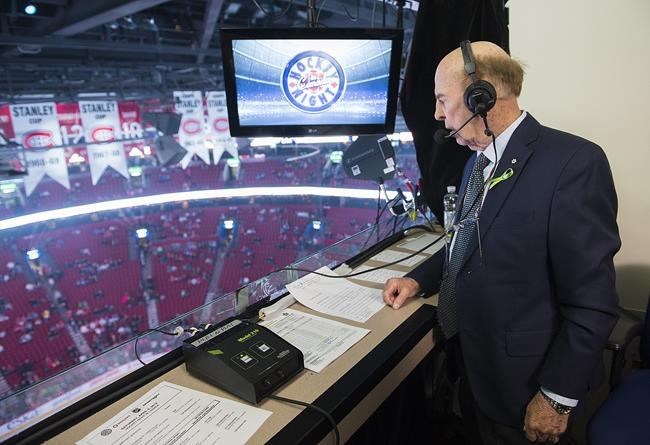ST. JOHN'S, N.L. — Newfoundlanders remember legendary "Hockey Night in Canada" sportscaster Bob Cole as a national star who proved that someone from the country's easternmost province could make it big on the mainland, all without moving away.
Cole's connection to Newfoundland and Labrador, including his home in the provincial capital, was "everything" to him, said Megan Cole, his daughter, in a message Friday.
"Many times through his career he was asked to move for the job, was offered broadcasting opportunities that would have taken him out of Newfoundland," she wrote. "Never, ever did he entertain this. He never wanted to leave here."
Bob Hallett, a founding member of Newfoundland folk-rock band Great Big Sea, said he and his band members would often be on the same plane as Cole as they returned to St. John's from gigs across the country.
"Even though he achieved the highest level of success you really can in that business, he did it while living in his own house," Hallett said in an interview Friday. "He was so good, he forced them to adapt to him, and not the other way around."
Cole died Wednesday at the age of 90, surrounded by his family in his beloved home city of St. John's. He was a giant of Canadian sports broadcasting and his career spanned more than half a century. With his signature wit, passion and "Oh baby!" exclamations, he brought life to some of hockey's biggest games.
Cole's father was a warden at a now-defunct prison camp in a rural part of Newfoundland about an hour's drive southwest of St. John's, his daughter said. Cole spent much of his summers out there as a young boy.
Over his life, he travelled to tiny outport fishing towns on the very tips of the rocky peninsulas that reach into the Atlantic Ocean from Newfoundland, she said. He loved salmon fishing in the province's rivers, which he called "the best in the world."
"Dad embodied the spirit of Newfoundlanders: resilient, strong, and a little quirky," she said. "He put up with nothing but let it all roll off his shoulders, too."
When he was working, he'd fly out of St. John's on Thursday or Friday, meet the coaches and get the team line-ups on Saturday morning in whatever city that night's game would be played in, his daughter said. He'd nap, wake up to cover the game, and be on a plane home the next day.
Sitting next to Cole on a three-hour flight from Toronto to St. John's was a privilege, Hallett said.
"He was so interesting and curious," he said. "Bob had an encyclopedic knowledge of ice hockey at all levels. He knew everything about all these players, he knew anecdotes about their family, and he could pluck them out of the ether."
Cole may not have had a strong Newfoundland accent or used common expressions from the island on air, but he certainly showcased the Newfoundland knack for storytelling and making any conversation lively and engaging, Hallett added.
For an artist like Hallett who was trying to make a living in the dark, anxious years that followed the closure of the province's once-lucrative cod fishery, Cole disproved all notions that Newfoundlanders and Labradorians were somehow less than their national counterparts.
Instead, he showed that people from the province could compete on a world stage, and win, Hallett said.
"He was able to adapt to the situation, and bring all that charm and intellect and St. John's wit into his world and make it work," Hallett said.
"He was a great Newfoundlander, and a great St. John's man, and a proper corner boy, and I'll miss him."
This report by The Canadian Press was first published April 26, 2024.
Sarah Smellie, The Canadian Press


